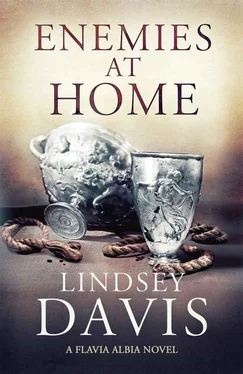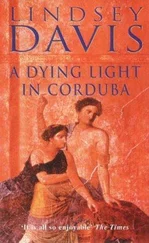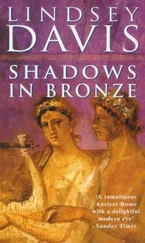Lindsey Davis - Enemies at Home
Здесь есть возможность читать онлайн «Lindsey Davis - Enemies at Home» весь текст электронной книги совершенно бесплатно (целиком полную версию без сокращений). В некоторых случаях можно слушать аудио, скачать через торрент в формате fb2 и присутствует краткое содержание. Жанр: Исторический детектив, на английском языке. Описание произведения, (предисловие) а так же отзывы посетителей доступны на портале библиотеки ЛибКат.
- Название:Enemies at Home
- Автор:
- Жанр:
- Год:неизвестен
- ISBN:нет данных
- Рейтинг книги:3 / 5. Голосов: 1
-
Избранное:Добавить в избранное
- Отзывы:
-
Ваша оценка:
- 60
- 1
- 2
- 3
- 4
- 5
Enemies at Home: краткое содержание, описание и аннотация
Предлагаем к чтению аннотацию, описание, краткое содержание или предисловие (зависит от того, что написал сам автор книги «Enemies at Home»). Если вы не нашли необходимую информацию о книге — напишите в комментариях, мы постараемся отыскать её.
Enemies at Home — читать онлайн бесплатно полную книгу (весь текст) целиком
Ниже представлен текст книги, разбитый по страницам. Система сохранения места последней прочитанной страницы, позволяет с удобством читать онлайн бесплатно книгу «Enemies at Home», без необходимости каждый раз заново искать на чём Вы остановились. Поставьте закладку, и сможете в любой момент перейти на страницу, на которой закончили чтение.
Интервал:
Закладка:
Hoping to refresh my spirits, I had the philosopher fetched.
Big mistake. His principle was that life is a turd we have stepped in, then we die. I could not tell which school of thought he belonged to, though it must be a gloomy one.
He had been bought by Mucia Lucilia on a whim at the slave market two years ago, merely as a fashionable accessory. He described her as a nice enough woman, but she made no intellectual demands of him, nor indeed of herself. Once she had boasted to all her friends that she owned a philosopher, Chrysodorus was simply forced to look after her very old, sick, smelly lapdoggie, a pampered thing called Puff.
He had been sleeping in a store room.
‘Alone?’
‘I can never be alone, dear. My duties are ceaseless. I shared the space with Puff.’
‘Because you love her really?’
‘No. Because no one else will have her near them.’
‘No hope of her sleeping on the end of her doting domina ’s bed?’
‘Not after the mistress married. Aviola put his foot down.’
‘Pity. She might have nipped the intruders.’
‘I doubt it. If thieves burst in, Puff would run away.’
‘And would you have done the same?’
He was enough of a philosopher to know this was a critical question. He sighed. ‘I would defend life, wretched though it is. One needs to be civilised — though god knows what for.’
‘To avoid crucifixion or being eaten by a lion, Chrysodorus … There must have been noise. Didn’t the dog waken?’
‘The dog is stone deaf.’
‘And you?’
‘I sleep the heavy sleep of doomed humanity. In explanation: since the dog snores atrociously, I have prevailed upon a medicine-man to give me a sleeping draught. He prescribes for the dog officially, but slips me a potion too.’
‘This doctor is on the staff?’
‘Aviola’s.’
‘Sent to Campania?’
‘Correct. Fortunately he left me supplies. Puff had been fed unsuitable titbits at the feast, so she was farting like a furnace-stoker. That became a night when I needed a sleeping draught merely to continue to exist.’
I tried to look sorry for him, though I am fond of dogs. ‘I have not seen a pooch at the apartment. What happened to her?’
‘Puff has been brought to me. My earthly suffering never ends.’
‘What will happen to Puff now your mistress has passed away?’
‘A vicious rumour whispers I am to be freed in Mucia Lucilia’s will — but legally compelled to take care of the dog. So, believe me, Flavia Albia, I gained no advantage from killing my mistress! The one joy I will take from being led into an arena is that I may feed bloody Puff to a wild beast as an appetiser.’
‘Then you can die happy?’
‘Happiness is an overrated concept.’
I would have liked to dispute that, but Chrysodorus seemed too glum to enjoy theoretical argument. Which may be overrated, I accept — though it’s better entertainment than listening to a string of people lying to you.
Well, they were slaves. You know the saying: I blame the owners.
I went and inspected Puff. She was the kind of dog you see in cities that are full of small apartments: a tiny, fragile-boned ratty thing, which seemed to be parts glued together from different varieties, none of them pretty. A woman’s lapdog — for a woman with no sense.
I did not pat or speak to Puff. She was no use to me. Dogs, like women, do not possess legal capacity and cannot bear witness in a Roman law court.
To change the script from masculine blather, I called Olympe as my next interviewee. I had heard her singing, in a low, unmistakably Lusitanian style. No one appeared to be listening.
She was scared, tiny and pretty. She looked her age, around fifteen, though she had more bust than Daphnus had suggested; she held herself in with a band. Her main instrument was the lyre, though she told me she could play the double flute passably. Mucia Lucilia had once heard her performing among a band of travelling entertainers, Olympe’s relatives, and offered to buy her. She had not been a slave before, but was sold into bondage by her family. It happens. I had once lived among people who were planning to do that to me.
Olympe had convinced herself that one day her relatives would be in funds and come to look for her. So she was dimmer than she looked, because I guessed they never would.
‘Don’t bank on it. You have a marketable skill, girl. Use that to make something of your life.’
Like Chrysodorus she was an exotic acquisition, though unlike him her mistress did frequently call on her skills. Olympe had played and sung at the feast. Afterwards she was tired, she claimed. She closeted herself with Amaranta in one of the good bedrooms. She heard nothing, though if she had, she would not have known what to do.
‘You could have yelled, Olympe. Called for other people to help.’
‘But I never knew I needed to.’
The robbers must have passed right outside the room where Olympe and Amaranta were asleep; that thought reduced her to helpless trembling. Olympe was the first of the accused slaves to show fear. She cried. She rushed across the room and clung to me. She begged me to help. She was terrified of facing trial (such as it would be; I didn’t disillusion her) and of the fate that a conviction would bring.
I was calming her when Manlius Faustus put his head around the door. He signalled that he would not disturb me; I mimed back that I had nearly finished. It had been a long session. He must have seen I was tiring; he sent in some basic refreshments.
What I liked about this aedile was that, having commissioned me, he made no attempt to muscle in on my interviews but left me to continue in my own style.
I next saw Amaranta, a neat, sad girl with many plaits and ribbons. Like Olympe, she was conscious of the threatening situation, though bore it with quiet resignation. I would not have classed her as a beauty, but she had enough vivacity to appeal to lustful male slaves. She possessed the manner of a very clever waiting-maid, and I reckoned she could deal with men.
I called her a girl because of her status; she was about my own age really, and said her mistress was the same. She had served Mucia Lucilia for ten years, helping her wash, dress, arrange her hair, put on jewellery. It was an intimate relationship. She tweezed Mucia’s eyebrows, cut her nails, made arrangements for sanitary cloths during her monthly periods. She had learned her moods, her hopes of making a good marriage, her annoyance that the trip to Campania had had to be delayed.
‘Yes, tell me: what caused this delay?’
‘We were not told.’ She paused slightly, and I wondered.
That night she must have been the last person other than Aviola to see Mucia alive. She had helped her mistress undress. She locked up the jewellery in its casket. Then, as I had been told by Olympe, the maid retired to one of the good bedrooms on the far side of the courtyard, in company with the young musician. They had the door closed, which Olympe had not explained, though Amaranta admitted it was to deter male slaves from wandering in.
‘Do you get much trouble?’
‘Nothing I can’t handle.’ I believed that.
I asked about her hopes for the future; did she want to marry and have a family?
Amaranta was non-committal about who she might share her life with, but readily said that she was on good terms with Mucia Lucilia, who had promised to free her as soon as she reached her thirtieth birthday. That was close enough for her to look forward to it patiently, but Amaranta was now frightened that Mucia’s death meant she would be sent to a slave market instead. Assuming she escaped the murder charge.
‘You don’t know what was in her will?’
‘No. What are our chances, Flavia Albia?’
Читать дальшеИнтервал:
Закладка:
Похожие книги на «Enemies at Home»
Представляем Вашему вниманию похожие книги на «Enemies at Home» списком для выбора. Мы отобрали схожую по названию и смыслу литературу в надежде предоставить читателям больше вариантов отыскать новые, интересные, ещё непрочитанные произведения.
Обсуждение, отзывы о книге «Enemies at Home» и просто собственные мнения читателей. Оставьте ваши комментарии, напишите, что Вы думаете о произведении, его смысле или главных героях. Укажите что конкретно понравилось, а что нет, и почему Вы так считаете.












